Cisco Network Engineers are responsible for designing, implementing, and managing network solutions that ensure reliable and secure connectivity. They play a key role in maintaining the backbone of an organization's IT infrastructure, ensuring that data flows smoothly and securely across networks.
Skills required for a Cisco Network Engineer include a strong understanding of networking protocols, proficiency in configuring Cisco devices, and the ability to troubleshoot network issues. Additionally, they need to have good analytical skills and the ability to work well in a team.
Candidates can write these abilities in their resumes, but you can’t verify them without on-the-job CISCO Network Engineer skill tests.
In this post, we will explore 8 essential CISCO Network Engineer skills, 8 secondary skills and how to assess them so you can make informed hiring decisions.
Table of contents
8 fundamental CISCO Network Engineer skills and traits
The best skills for CISCO Network Engineers include Network Protocols, Routing and Switching, Network Security, Cisco IOS, Network Design, Troubleshooting, Wireless Networking and Virtualization.
Let’s dive into the details by examining the 8 essential skills of a CISCO Network Engineer.
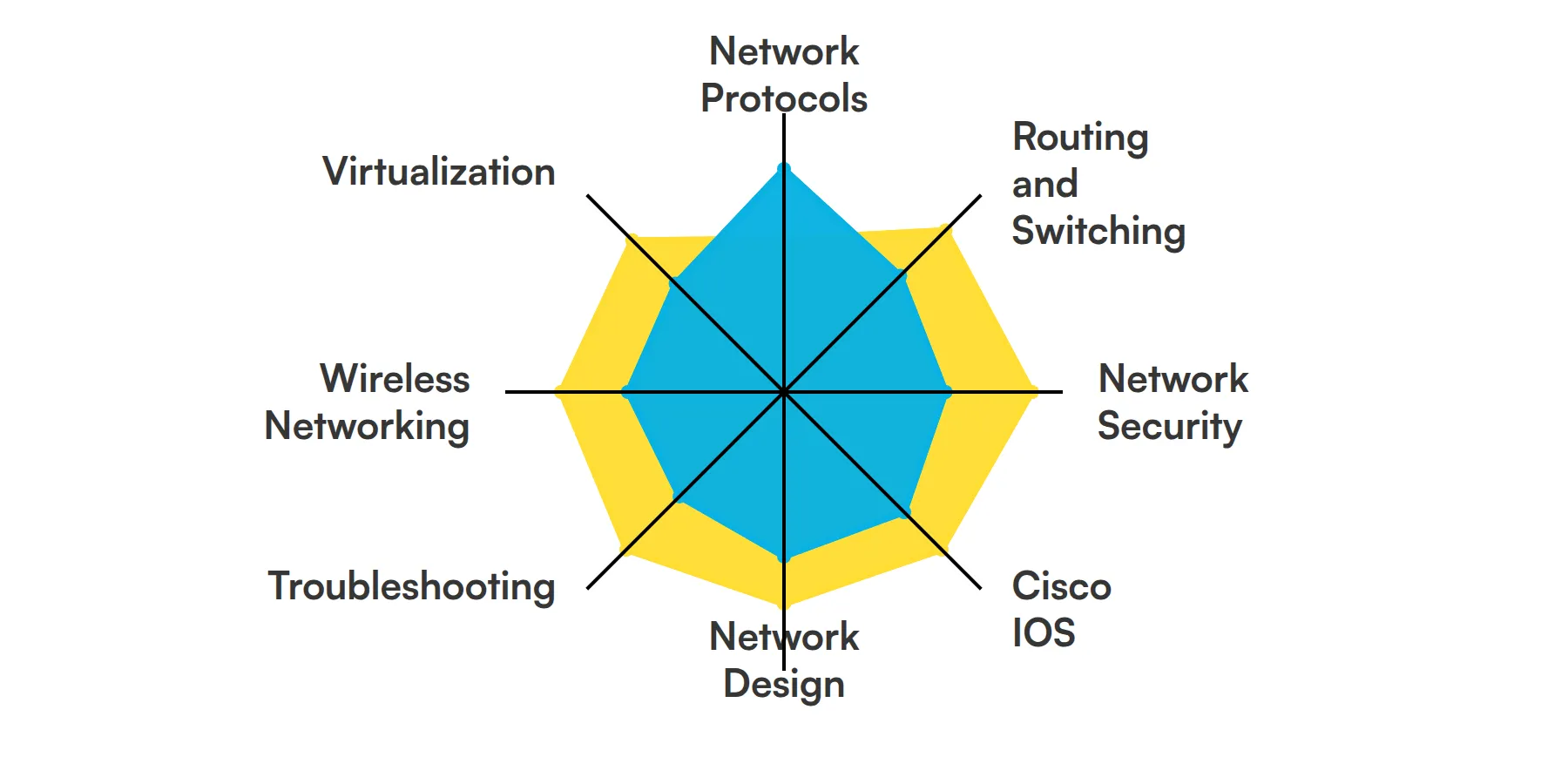
Network Protocols
Understanding network protocols like TCP/IP, BGP, and OSPF is fundamental for a Cisco Network Engineer. These protocols are the language of the internet, enabling communication between devices. Mastery of these protocols allows engineers to design, implement, and troubleshoot complex network infrastructures.
Check out our guide for a comprehensive list of interview questions.
Routing and Switching
Routing and switching are core skills for managing data flow across networks. Cisco Network Engineers use these skills to configure routers and switches, ensuring efficient data transmission and network reliability. This knowledge is crucial for maintaining network performance and connectivity.
Network Security
With increasing cyber threats, network security is paramount. Cisco Network Engineers must be adept at implementing security measures like firewalls, VPNs, and intrusion detection systems to protect network integrity and data confidentiality. This skill helps in safeguarding against unauthorized access and potential breaches.
For more insights, check out our guide to writing a Cyber Security Engineer Job Description.
Cisco IOS
Cisco's Internetwork Operating System (IOS) is the software used on most Cisco routers and switches. Proficiency in Cisco IOS allows engineers to configure and manage network devices effectively. This skill is essential for executing commands and troubleshooting network issues.
Network Design
Designing a network involves planning its architecture to meet organizational needs. Cisco Network Engineers use this skill to create scalable and efficient network layouts, considering factors like bandwidth, redundancy, and future growth. A well-designed network ensures optimal performance and reliability.
Troubleshooting
Troubleshooting is the ability to diagnose and resolve network issues quickly. Cisco Network Engineers rely on this skill to maintain network uptime and address connectivity problems. Effective troubleshooting minimizes downtime and ensures seamless network operations.
Check out our guide for a comprehensive list of interview questions.
Wireless Networking
As wireless networks become more prevalent, understanding wireless technologies is crucial. Cisco Network Engineers use this skill to deploy and manage wireless networks, ensuring robust connectivity and performance. This includes configuring access points and optimizing wireless coverage.
Virtualization
Virtualization involves creating virtual versions of network resources, enhancing flexibility and efficiency. Cisco Network Engineers use virtualization to optimize resource utilization and simplify network management. This skill is important for modern network environments that leverage virtual networks and services.
8 secondary CISCO Network Engineer skills and traits
The best skills for CISCO Network Engineers include Cloud Networking, Scripting and Automation, Quality of Service (QoS), IPv6, VoIP, Load Balancing, Network Monitoring and Data Center Networking.
Let’s dive into the details by examining the 8 secondary skills of a CISCO Network Engineer.
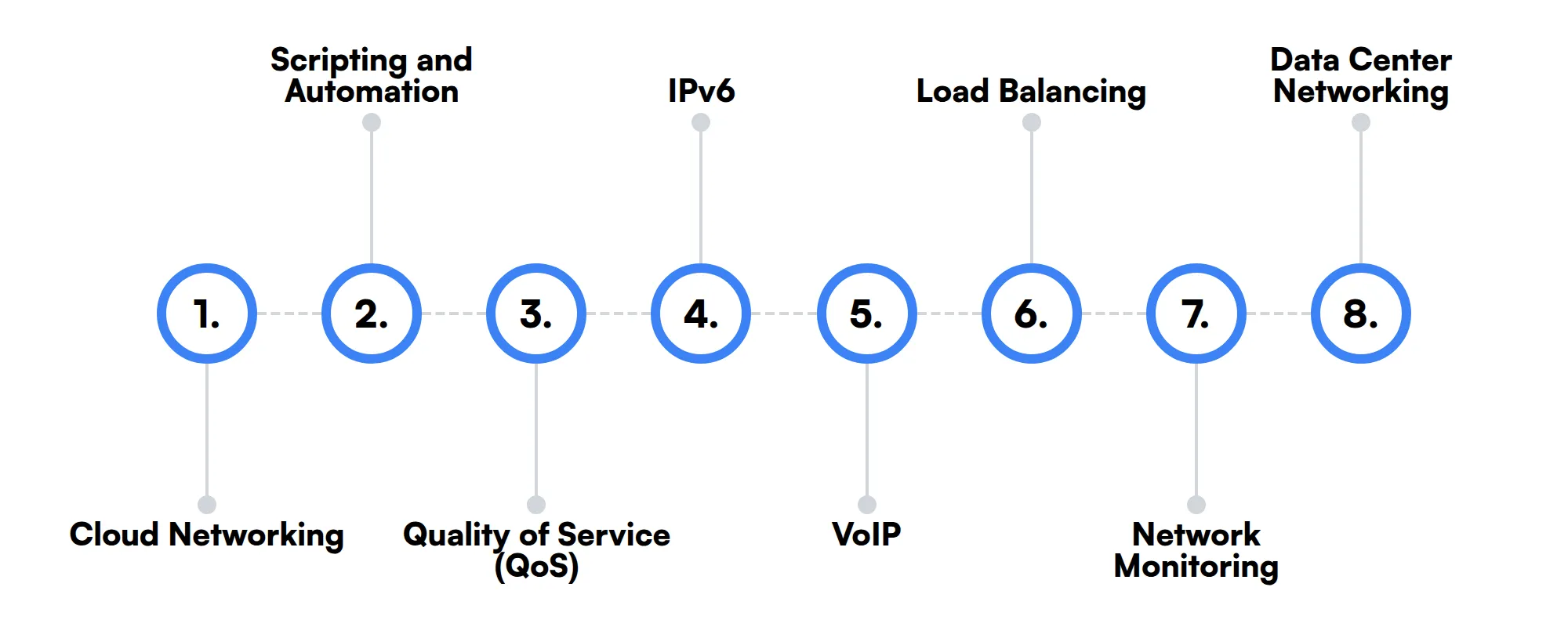
Cloud Networking
With the rise of cloud computing, understanding cloud networking is beneficial. Cisco Network Engineers can leverage cloud services to extend network capabilities and improve scalability.
Scripting and Automation
Automation reduces manual tasks and increases efficiency. Cisco Network Engineers use scripting languages like Python to automate network configurations and management tasks.
Quality of Service (QoS)
QoS is about managing network traffic to ensure optimal performance for critical applications. Cisco Network Engineers use QoS to prioritize traffic and manage bandwidth effectively.
IPv6
As IPv4 addresses become scarce, knowledge of IPv6 is increasingly important. Cisco Network Engineers need to understand IPv6 to support modern network infrastructures.
VoIP
Voice over IP (VoIP) allows voice communication over the internet. Cisco Network Engineers use this skill to implement and manage VoIP systems, ensuring clear and reliable communication.
Load Balancing
Load balancing distributes network traffic across multiple servers to ensure reliability and performance. Cisco Network Engineers use this skill to optimize resource use and prevent overload.
Network Monitoring
Monitoring tools help track network performance and detect issues. Cisco Network Engineers use network monitoring to maintain visibility and ensure network health.
Data Center Networking
Data centers are critical for hosting applications and services. Cisco Network Engineers need to understand data center networking to manage and optimize these environments.
How to assess CISCO Network Engineer skills and traits
Assessing the skills and traits of a Cisco Network Engineer requires a comprehensive approach that goes beyond just reviewing resumes. While certifications and degrees can provide a baseline understanding of a candidate's knowledge, they don't fully capture their ability to apply these skills in real-world scenarios.
To truly understand a candidate's proficiency in key areas such as network protocols, routing and switching, and network security, it's important to use skills-based assessments. These assessments provide a clearer picture of a candidate's capabilities and how they might fit into your team.
Tools like Adaface on-the-job skill tests can significantly streamline this process, offering a 2x improved quality of hires and an 85% reduction in screening time. By focusing on practical skills, these assessments help ensure that candidates are not only knowledgeable but also capable of handling the challenges they will face in their role.
Let’s look at how to assess CISCO Network Engineer skills with these 4 talent assessments.
Network Engineer Online Test
Our Network Engineer Online Test evaluates candidates on a broad range of technical skills necessary for network engineering, such as network protocols, security, and troubleshooting.
The test assesses candidates' knowledge in designing and maintaining network infrastructures, managing network performance, and ensuring secure and efficient data transfer across different network types like LAN and WAN.
Successful candidates demonstrate a strong ability to diagnose and resolve complex network issues, ensuring reliable connectivity and optimal network performance.
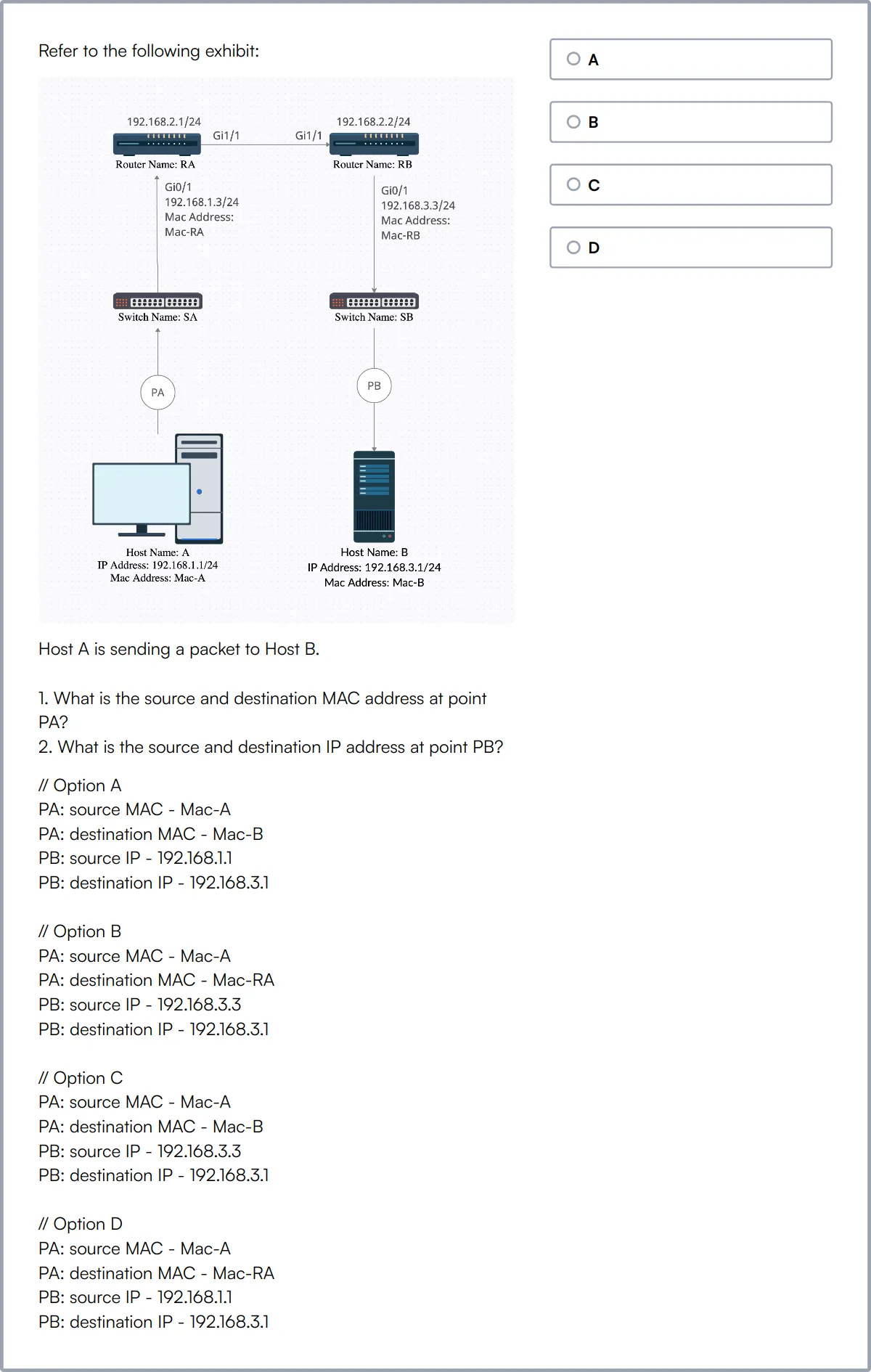
CISCO Routing Switching Test
Our CISCO Routing Switching Test focuses on evaluating the candidate's expertise in configuring and troubleshooting Cisco routers and switches.
This test covers essential areas such as Cisco Router and Switch Configuration, Routing Protocols like OSPF and BGP, and advanced switching technologies including VLANs and QoS.
Candidates proficient in this test are adept at implementing and managing complex routing and switching solutions that are critical for maintaining efficient network operations.
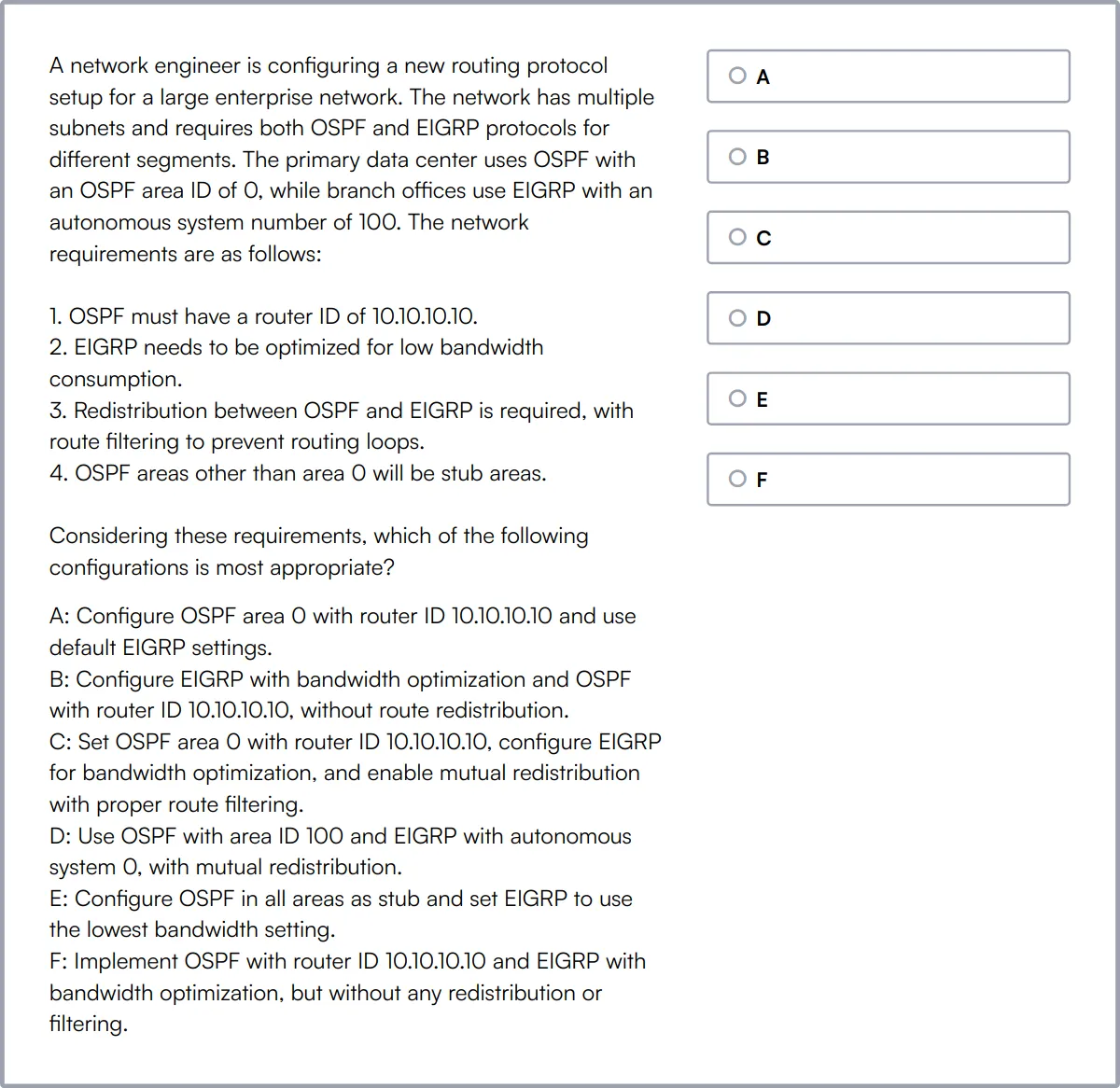
CISCO Security Online Test
The CISCO Security Online Test is designed to assess candidates' understanding of network security using Cisco's security solutions and appliances.
It evaluates knowledge in areas such as Cisco Firewall, IPS/IDS, and VPN technologies, along with broader network security concepts and best practices for access control and threat management.
High-scoring individuals in this test are capable of designing and implementing secure network architectures that effectively protect against modern security threats and vulnerabilities.
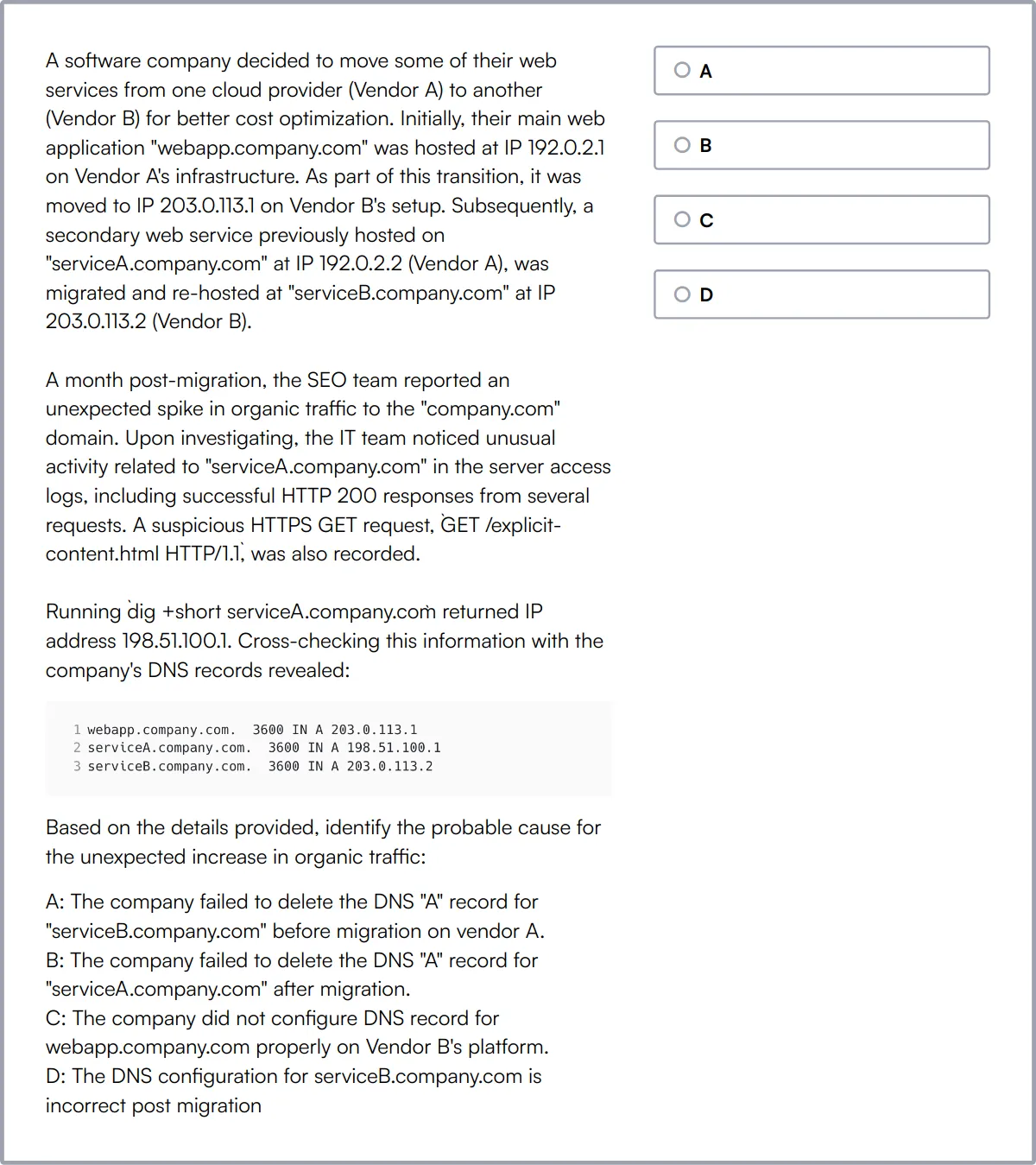
Cloud Computing Online Test
Our Cloud Computing Online Test assesses candidates on their knowledge of cloud technologies, including service and deployment models, virtualization, and cloud security.
The test challenges candidates with scenarios involving cloud scalability, elasticity, storage solutions, and networking within the cloud environment.
Candidates who excel in this test demonstrate a thorough understanding of how to leverage cloud computing to enhance organizational efficiency and data management.
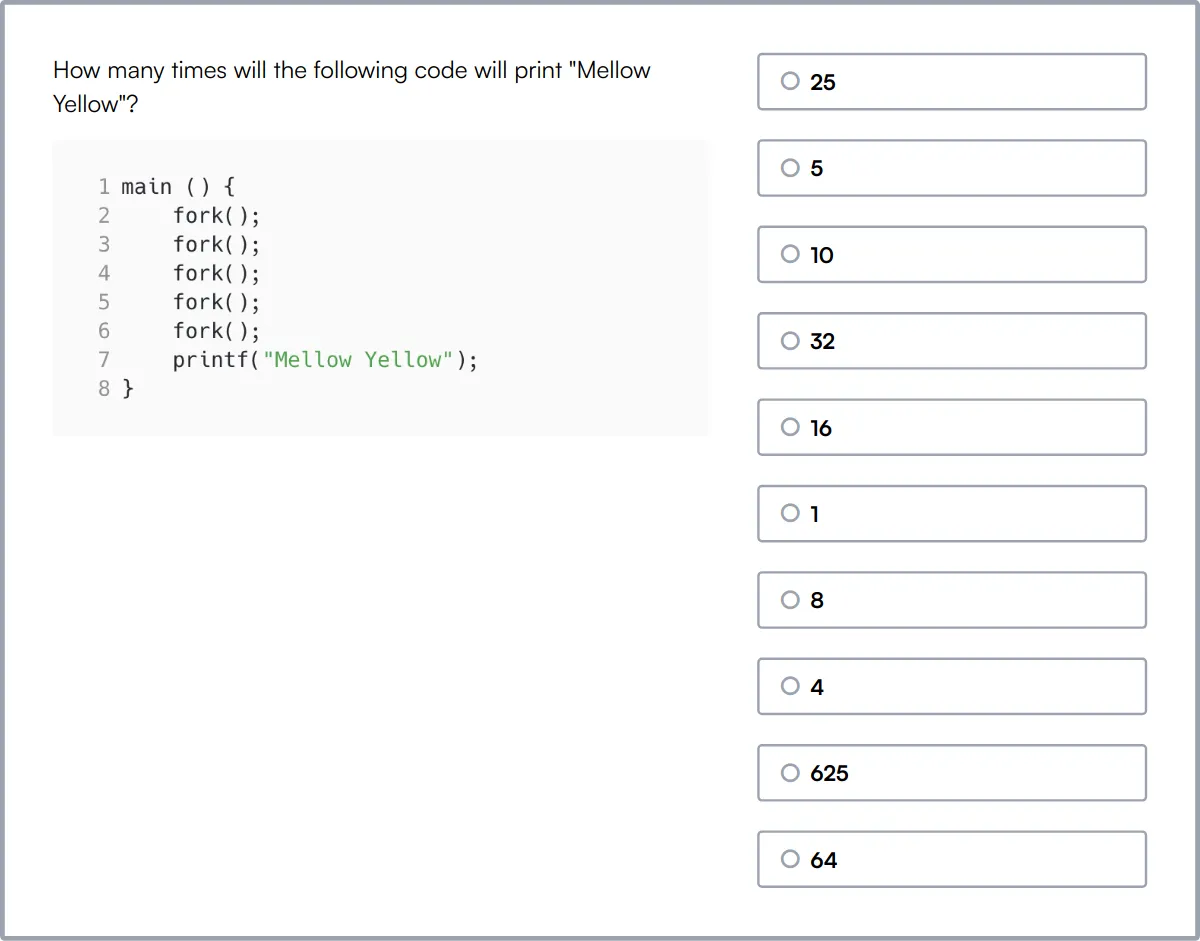
Summary: The 8 key CISCO Network Engineer skills and how to test for them
| CISCO Network Engineer skill | How to assess them |
|---|---|
| 1. Network Protocols | Evaluate candidate's understanding and application of various network protocols. |
| 2. Routing and Switching | Assess ability to configure and optimize network routes and switches. |
| 3. Network Security | Test knowledge of securing networks against various threats. |
| 4. Cisco IOS | Check proficiency in using and configuring Cisco IOS software. |
| 5. Network Design | Review capability to design efficient, scalable network architectures. |
| 6. Troubleshooting | Determine skill in identifying and resolving network issues. |
| 7. Wireless Networking | Gauge experience with deploying and managing wireless networks. |
| 8. Virtualization | Examine expertise in implementing and managing virtual network environments. |
CISCO Data Center Online Test
CISCO Network Engineer skills FAQs
What are the key network protocols a Cisco Network Engineer should know?
A Cisco Network Engineer should be familiar with protocols like TCP/IP, OSPF, EIGRP, BGP, and MPLS. Understanding these protocols is important for configuring and managing networks.
How can a recruiter assess a candidate's skills in routing and switching?
Recruiters can use technical interviews with scenario-based questions, practical tests on Cisco equipment, or simulations to evaluate a candidate's routing and switching skills.
What tools can be used to assess network security skills?
Tools like Wireshark, Cisco ASA, and security-focused labs can help assess a candidate's ability to secure networks and understand security protocols.
Why is knowledge of Cisco IOS important for network engineers?
Cisco IOS is the operating system used on Cisco devices. Engineers need to configure, manage, and troubleshoot Cisco routers and switches using IOS commands.
How can scripting and automation skills be evaluated?
Assess scripting skills by asking candidates to write scripts in Python or use tools like Ansible for network automation tasks during interviews or tests.
What is the significance of IPv6 knowledge in networking?
IPv6 is the latest IP protocol, addressing the limitations of IPv4. Understanding IPv6 is important for future-proofing networks and ensuring compatibility.
How do you assess a candidate's ability in network design?
Evaluate network design skills by reviewing past projects, asking candidates to create network diagrams, or solving design scenarios during interviews.
What role does virtualization play in modern networking?
Virtualization allows for the creation of virtual networks and devices, improving resource utilization and flexibility. It's key in data centers and cloud environments.

40 min skill tests.
No trick questions.
Accurate shortlisting.
We make it easy for you to find the best candidates in your pipeline with a 40 min skills test.
Try for freeRelated posts
Free resources



